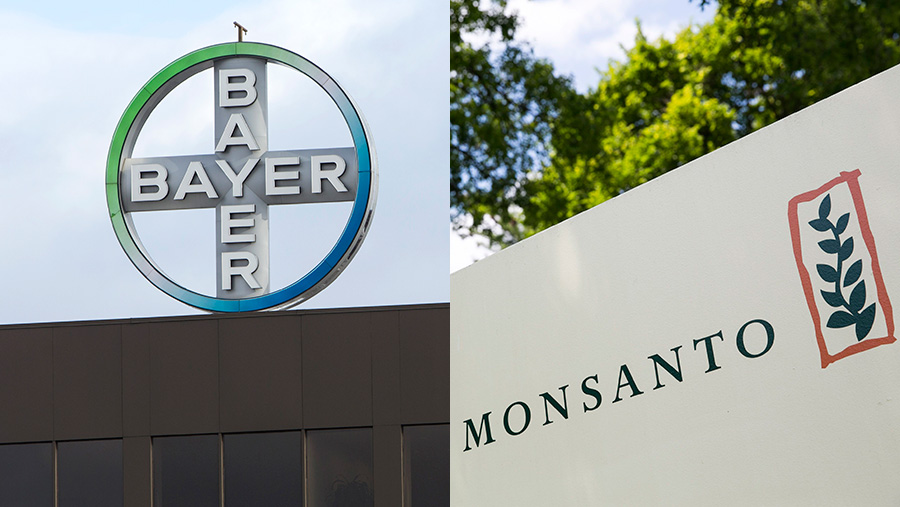Bayer argues Monsanto deal will be good for farmers
 © DD PUSA/REX/Shutterstock
© DD PUSA/REX/Shutterstock Agrochemicals giant Bayer argues that its planned takeover of Monsanto will be good for farmers, leading them to achieve higher yields and profitability rather than limiting industry competition.
The tie-up between the German company and the world’s largest seeds group is set to help growers as the US group will bring its expertise in biological and digital farming to the merged group.
Liam Condon, president of Bayer’s Crop Science business, said the combined company will help growers find farming solutions to allow their businesses to prosper in the future.
“This will add value for the growers to improve yields and profitability, and if not, growers can always choose to go for something different,” he told Farmers Weekly.
The takeover will create the globe’s biggest integrated seeds and agrochemicals company.
See also: Digital crop spraying system set to arrive in 2019
Faster innovation
Mr Condon argued the merged company will innovate faster, help growers use inputs more efficiently and allow new technology to be taken up by poor and rich farmers alike.
The US$66bn (£49bn) takeover will join together Bayer’s pesticides such as Aviator and Atlantis with Monsanto’s oilseed rape varieties Exalte and Extrovert and its glyphosate herbicide Roundup.
Some disposals are likely to get approval for the deal early next year, but it will still create a group selling seeds, seed dressing, pesticides, biologicals and an increased digital offering.
“Most growers will test and try out our solutions and see which one will suit them,” Mr Condon said.
His colleague, Mathias Kremer, is adamant the deal will leave farmers better off as the combined group will be able to provide growers with the right seeds, seed traits, biologicals, pesticides and digital farming technology.
“This will increase the value for the farmer,” said the group’s head of crop strategies and portfolio management.
Digital exposure
Marc Reichardt, head of agricultural commercial operations, said the purchase of Monsanto will give Bayer more biological and digital exposure and was a key driver behind the deal.
The move into digital farming, offering spot spraying of weeds or varying fungicide rates across a field, may lead to less pesticides being sold by the combined group, but it would be selling these services to farmers.
Although three big deals – ChemChina’s takeover of Syngenta, the Dow-DuPont merger and the Bayer deal – will leave fewer big seed and pesticide suppliers, Mr Reichardt said new companies are likely to enter the field.
Dow-DuPont had to sell off some of DuPont’s herbicide business and ChemChina needed to sell off some of its Adama business to get European Union agreement.
“There will be plenty of different options for the farmer, so we don’t see it as a problem, as there will be lots of new entrants to the market,” he said.
Slowdown in growth
Pressure on Bayer – and others in the sector – has mounted as Bayer Crop Science group’s 12% sales growth in 2012 slumped to a predicted small fall in 2017, possibly prompting the move for Monsanto.
Mr Condon said Bayer is willing to sell off businesses with annual sales of US$1.6bn (£1.18bn) to seal the deal and these are likely to be in two areas – seed and traits and also herbicides.
“There is not much overlap, as Monsanto is a big seeds company with some herbicides and Bayer is a big pesticides group with a small seed business,” he said.
Mr Condon added that Bayer was in talks with other parties about what it might have to sell off to get the deal approved.
The European Commission has identified areas where competition is at risk, naming Monsanto’s weedkiller glyphosate, or Roundup, which competes with Bayer’s glufosinate and also oilseed rape breeding.
Analysts believe Bayer will look to sell off the contact-acting herbicide glufosinate, which is used largely in North and South American soya beans, maize and rapeseed crops, and also some of its rapeseed business.
The European Union is expected to give its final decision on the merger by 22 January 2018.
The Bayer executives were speaking to Farmers Weekly at a Bayer Crop Science Future of Farming briefing earlier this week at the group headquarters in Monheim, Germany.

